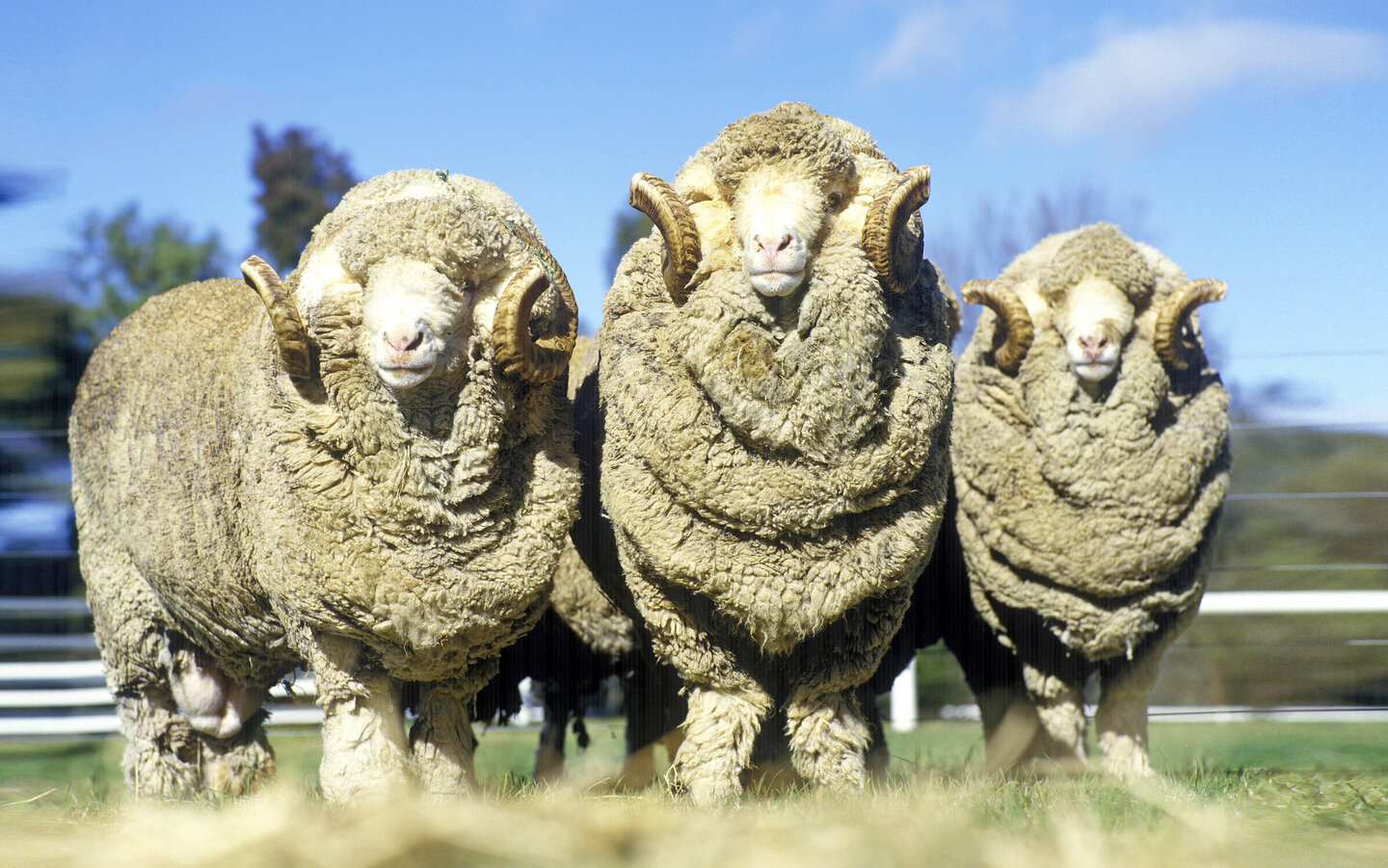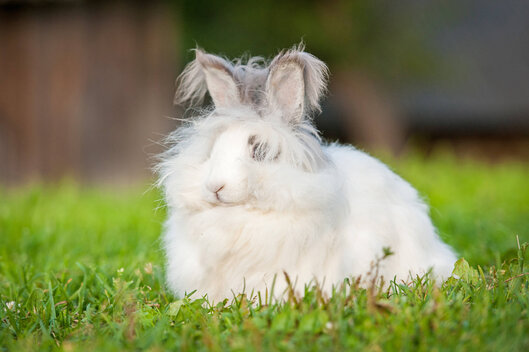Merino sheep suffer from breeding and painful mulesingWhy you shouldn't buy merino wool
Merino wool is a big seller. But for most of the cozy sweaters, coats, functional jackets, hats, blankets or scarves made from this natural fiber, countless Merino sheep in Australia suffer painful mutilations.
Farmers cut off folds of skin from merino sheep
The industry in Australia subjects merino sheep to mulesing. In this cruel procedure, farmers use special scissors to remove the folds around the animals' anus and vulva. This is usually done without or with insufficient anesthesia or painkillers and is intended to prevent fly maggots from settling there. Alternatively, they cut off the blood supply to the skin folds with plastic clips or remove the skin areas with liquid nitrogen, known as freeze mulesing. This causes the body parts to slowly die or freeze, which is just as painful as the cutting itself¹. Mulesing is the order of the day in Australia. 80 percent of merino wool comes from there².
In figures
of Australian merino wool comes from mulesed sheep³, only about 20% is mulesing-free.
weeks old are the lambs with the painful cuts or clippings.
Australian farmers had already declared that they would end mulesing by 2010. An empty promise.
Merino sheep live roughly in Germany⁴. They have no unnatural folds. Their coarser wool is used as insulation material in house construction, among other things.
Fly maggots nest in the sheep's merino wool
Merino sheep are susceptible to fly maggots because they have an unnaturally large number of skin folds. The animals are specially bred to produce as much and as fine merino wool as possible. More skin, more wool, more profit. However, moisture collects under the skin folds and the skin folds in the anal and genital regions in particular quickly become dirty. The accumulated droppings and urine attract flies, which lay their eggs. When the fly maggots hatch, they eat into the tissue of the Merino sheep. The affected areas become inflamed and, in the worst case, the animals can die as a result.
Merino sheep suffer from open wounds
The shepherds prevent infestation by fly maggots by removing the skin folds. Wool no longer grows on the smooth scars and flies no longer lay their eggs here. However, mulesing is the least time-consuming and most painful method. Those responsible often do not even treat the wounds afterwards. The open areas are the size of the palm of a hand and have to heal or scar on their own. Merino sheep pay a very high price so that the industry can reap huge profits. Neither fashionable bargains nor the cuddle factor of merino wool should be worth it.
How you can help the Merino sheep
Do not buy wool that has been produced in Australia under mulesing or whose origin is unknown. When buying wool and wool products, ask about the origin. In New Zealand and South Africa, for example, where merino wool is also produced, mulesing is prohibited and it is not common in Argentina. If you are not informed about the origin, do not buy merino wool. By making conscious decisions and targeted purchases, each individual can set an example and help to put an end to this cruelty to animals.
Buy products made from natural plant fibers instead. Cotton, linen, sisal, hemp or jute are real alternatives without animal suffering. There are now also exciting alternatives for other animal products such as leather, such as cork, mushrooms and pineapple or synthetic fibers from sustainable recycling. You can find out more about animal-friendly fashion in our leaflet "Vegan clothing"
This is what the German Animal Welfare Federation demands
We reject the cruel and painful mutilation of animals for economic reasons. Politics, trade and agriculture are called upon to put an end to this cruelty to animals.
We advocate breeding animals that have less pronounced skin folds and therefore less wool in the anus area. The owners of today's overbred animals should trim their hindquarters several times a year instead of painfully removing the skin. They could also treat these sheep preventively with insecticides if the products have no side effects for the animals and do not remain in the wool.
We appeal to the fashion industry and retailers to use plant-based alternatives or at least merino wool that has been produced without mulesing. We recommend that consumers do not buy merino wool from Australia, where mulesing is commonplace. Instead, opt for products made from natural plant-based fibers.
Sources
¹ Government of Western Australia Department of Primary Industries and Regional Development's Agriculture and Food (2022, December 7). Managing non-mulesed sheep. https://www.agric.wa.gov.au/livestock-parasites/managing-non-mulesed-sheep [accessed 24.03.2023]
² Cappelli, R. (2022) Slay. Singapore, USA:Let Us Be Heroes (00:56:06 - 00:56:36)
³ Government of Western Australia Department of Primary Industries and Regional Development's Agriculture and Food (2022, December 7). Managing non-mulesed sheep. https://www.agric.wa.gov.au/livestock-parasites/managing-non-mulesed-sheep [accessed 24.03.2023]
⁴ It is assumed that there are 1.5 million sheep in Germany (Federal Statistical Office (2023). Schafbestände leicht gestiegen.https://www.destatis.de/DE/Themen/Branchen-Unternehmen/Landwirtschaft-Forstwirtschaft-Fischerei/Tiere-Tierische-Erzeugung/schafe.html [retrieved on 24.03.2023]) and the proportion of Merino (land) sheep is around 30% (plus Merino longwool sheep 0.8% and Merino meat sheep 1.4%): Mendel , C. (2022). Praktische Schafhaltung. Stuttgart (Hohenheim): Eugen Ulmer KG.




